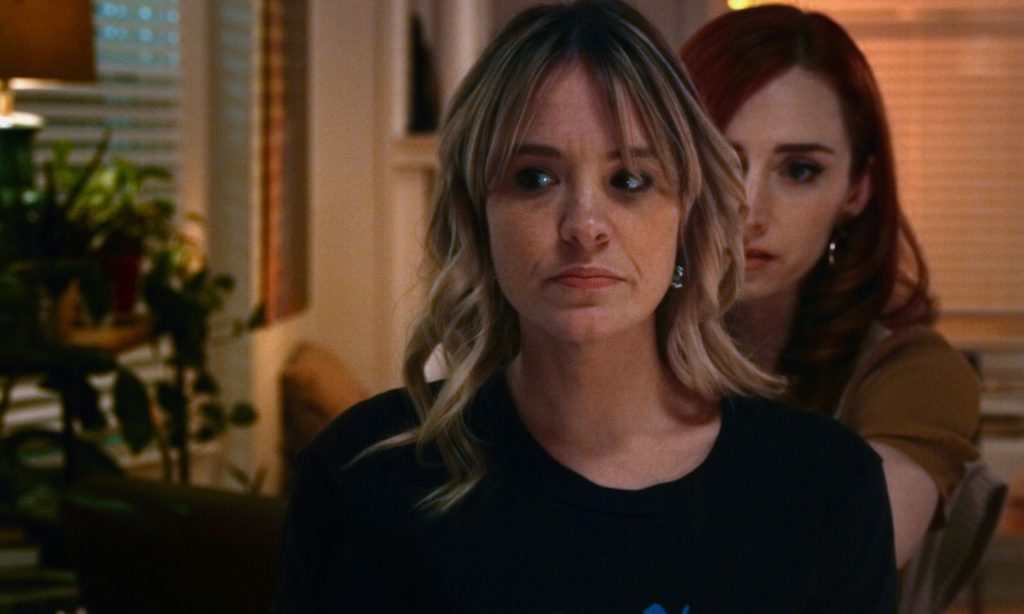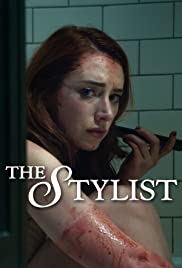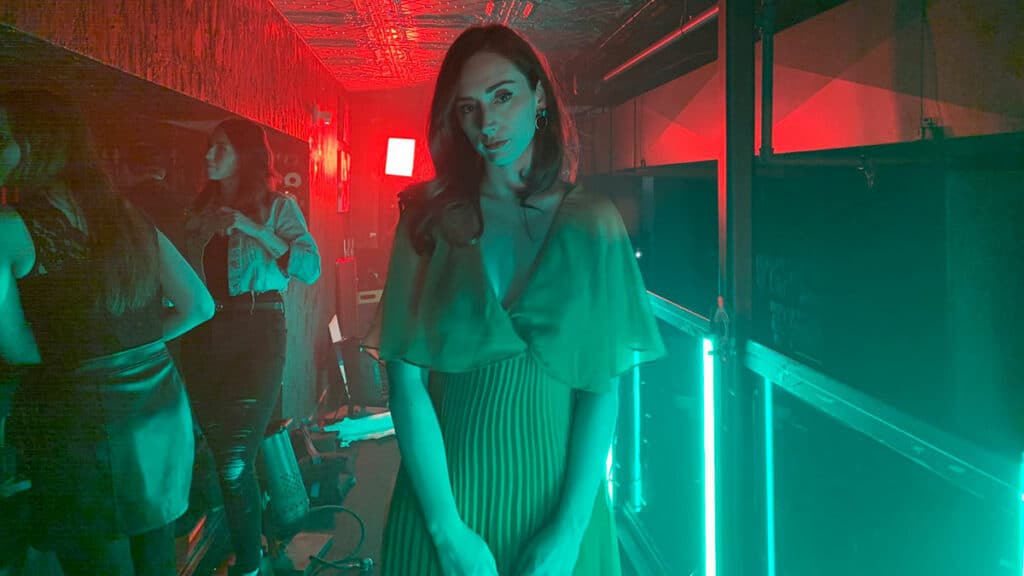
Using elements of fantasy or horror seem to allow a filmmaker to approach many subjects which may not come to light by more conventional means. One of these subjects is loneliness. On first consideration this may seem strange, but it’s in the realms of horror and fantasy that human loneliness is often brought into closest focus. The means may be bizarre, but unpicking an often warped tale to find authentic humanity underneath is often all the more rewarding and meaningful – as if it’s brought into sharper relief by this process. This is definitely the case with The Stylist (2020), a film which can trace something of its lineage back through a number of other horror films, but stands on its own as a study of painful isolation and alienation. The basic plot reads like something from the Grand Guignol, but in the telling, we find a genuine example of pathos.
Claire (Najarra Townsend) is the hair stylist of the title: she works in a small salon, she’s good at what she does, and she has an array of regular clients with whom she’s on good terms. So far, so good, but any meaningful connections to people beyond this seem to be lost to her. Left to her own devices, Claire turns the day job into an opportunity to hurt people; seemingly wanting to ‘claim’ something of her clients’ lives, she takes this literally, drugging them and taking their scalps, which she uses to pretend to be them for a few moments before retreating into a self she clearly doesn’t care too much for. We’re shown very early on that this is something she’s been doing for a while; there’s plenty of evidence, stashed in a small room of her house. The evident pain – rather than jubilance – this causes her helps us, as the audience, to scoot over the finer details of how she’s gotten away with this for so long, but this is a key way in which the horror/fantasy elements are held in check by a sensitive, often understated central performance.
It all feels like things are already heading for chaos; the film excels at a kind of impending doom which hangs over even the tamer, humdrum moments: buying a chai latte, doing the day job. However, things are brought into sharper relief when regular client Olivia (Brea Grant) gets in touch unexpectedly: she’s getting married, and as she’s been let down by the stylist she originally hired, could Claire please stand in? Claire is at first evasive, but when she agrees she gets quickly drawn into Olivia’s world by the simple fact that Olivia is a friendly, open sort of person. This leads Claire to become fixated on Olivia, both wanting to reach out and make a friend, and feeling desperate to retreat from a situation she has no skills set to deal with. Her brief moments of flattery and pleasure at being included quickly segue into self-loathing and anger; she is hyper-sensitive to rejection, and as she struggles to navigate, her emotional state grows worse and worse. From Olivia’s perspective, the road to hell is paved with good intentions.

With different handling, this basic premise could have looked drastically different on screen: it has enough recognisable elements that could have been played out as a straightforward, gory skit with dem crazy women caught up in the middle. However, it never feels like that. Claire’s pain, as she tries to navigate her interactions with Olivia, is incredibly moving. She captures that note of angst which surely everyone has felt during their lives and makes her personal sadness deeply involving; actress Najarra Townsend does much of this with looks and gestures, rather than lines of dialogue. Claire actually says very little overall, struggling to get most of her words out when in Olivia’s presence and doing her damnedest to make the conversation flow. She’s happier emulating other people than speaking for herself, and she would rather sneak into people’s lives than be openly invited, as if this strips her of the limited agency she has.
As for Olivia, she comes across as the sort of person Claire could have been, had she the sorts of connections and support which have helped Olivia get to where she is in her life. That we’re so often presented with both women at the same points in time via a split-screen underlines this, as well as affirming the feeling of a collision course being set. On the surface, they don’t appear so different: each is young, attractive and career-driven. Claire’s presentation as a stylish, well-dressed woman could give the lie to the idea that she could ever be wracked with self-doubt and unhappiness, but it’s only moments before we see what her very real unhappiness causes her to lash out and do. Claire is continuously humanised by being so often the only person in shot, too. To some extent, the film reminds me of May (2002), another sensitive story about an isolated, flawed young woman trying to find her way through an often unfeeling world, but if The Stylist has any clear precedent, to me it feels like Maniac (2012). Not only is the modus operandi the same – there’s the same sense of a sympathetic, withdrawn loner being pushed over the edge by a person intending kindness, rather than harm. In both films, this feels genuinely tragic.
The Stylist is a thoughtfully-composed horror story, as compassionate as it is grisly, with careful, plausible characters and an ending which feels both incredibly OTT and somehow inevitable. Short films don’t always necessarily work when expanded to feature-length, but it works very well here: it’s definitely recommended.
The Stylist (2020) screened at the Celluloid Screams Horror Festival in Sheffield, England.
